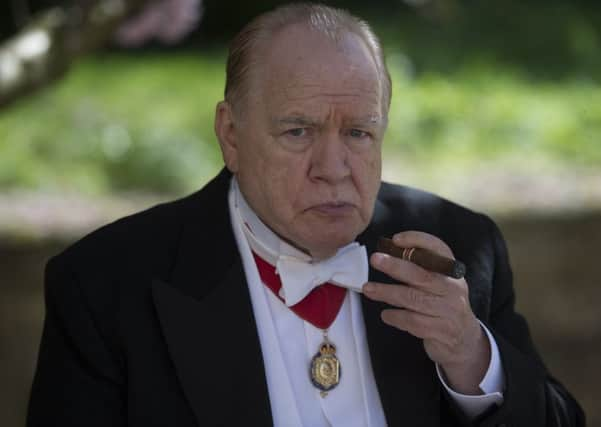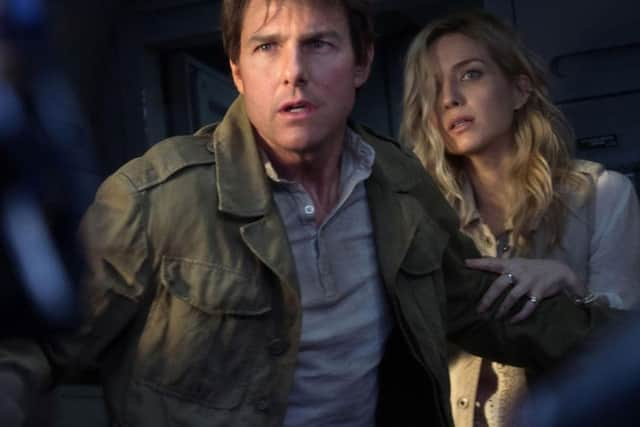Film reviews: Churchill | Gifted | Whitney: Can I Be Me | The Mummy


Churchill (PG) **
Gifted (12A) ***
Whitney: Can I Be Me (15) ***


The Mummy (15) **
Churchill finds Britain’s favourite Briton in the odd position of being the central character in a biopic intent on following the template of The King’s Speech, despite focusing on a portion of his life wholly unsuited to such a treatment. Set in the run up to D-Day, long after his nation-rallying “Fight them on the beaches” speech, it finds Winston haunted instead by the beaches of Gallipoli, the disastrous First World War campaign he orchestrated 30 years earlier when he was First Lord of the Admiralty.
Played by Brian Cox, this version of Churchill is a depressed, boozy, bumbling liability who is being forced to confront his own obsolescence towards the end of a war in which the Allied cause has been overtaken by the Americans and the leadership of General Eisenhower (Mad Men’s John Slattery). Convinced the planned Normandy landings are going to be a disaster, Churchill makes his misgivings clear to an unimpressed Eisenhower and spends the rest of the movie stomping around the cabinet war rooms drawing up alternative plans and making insane-sounding suggestions.
Advertisement
Hide AdIt’s an interesting side of him to dramatise, but the film botches its execution. Historian-turned-screenwriter Alex von Tunzelmann’s script may attempt to contextualise Churchill’s state of mind by teasing out ideas about the demise of the British Empire, but it’s also full of terrible lines designed to ratchet up the conflict between Churchill and Eisenhower. This isn’t helped by the attempts of director Jonathan Teplitzky (The Railway Man) to force its darker elements into the framework of a more inspirational redemption story. At the centre is Cox, who looks the part without the prosthetics getting in the way and is good at tapping into the performative aspects of political leadership. Sadly, his domineering approach can’t raise the material above the level of caricature.


In Gifted, Captain America’s Chris Evans stars as a slumming-it academic trying to give his seven-year-old maths prodigy niece (McKenna Grace) a normal childhood following the suicide of her genius mother. Deciding it’s time to send her to a regular school, he soon finds himself locked in a protracted custody battle with his own mother (Lindsay Duncan), who wants her estranged granddaughter to fulfil her true potential. Directed by 500 Days of Summer’s Marc Webb – returning to smaller scale work after his quickly forgotten Spider-Man reboots – this isn’t quite the ruthless tearjerker it could have been, but it’s still pretty contrived and manipulative (Evans even gets an old-fashioned superhero moment with a dramatic cat rescue). Nevertheless, the lead performances are charming enough and there’s decent support from Jenny Slate as a teacher who falls for Evans, who’s known around town as the “local damaged hot guy”.
Whitney: Can I Be Me director Nick Broomfield has made a career out of crafting revealing documentary portraits of people whose closest confidants are reluctant to talk to him. What’s missing from his new film about the late Whitney Houston, though, is his usual intrepid on-camera efforts – boom-mic in hand – to track down the prize interviewees: in this case Houston’s former husband Bobby Brown and her long long-time associate Robyn Crawford, with whom she was rumoured to be in a relationship. Instead, he has access to never-before-seen footage from an abandoned 1999 backstage documentary (shot by co-director Rudi Dolezal) and he augments this with dozens of sit-down interviews with estranged family members and former employees no longer connected to the Houston estate. What emerges is still a fascinating story, one that gives a decent overview of Houston’s troubled background and career. It also locates the seeds of her demise – she was found dead in a hotel bathtub in 2012 – in the moment she met self-styled R&B bad boy Bobby Brown. The fatefulness of that meeting is certainly amplified by the fact it coincided with Whitney being booed by her peers at the 1989 Soul Train awards for the so-called crime of “selling out”, however the film as a whole lacks the scope and historical insight necessary to develop this into a rigorous thesis about the way race, gender and sexuality contributed to her tragic downfall.
Hollywood’s current obsession with creating cinematic universes instead of good movies takes another hit with The Mummy, a film that could have been a perfectly serviceable Tom Cruise vehicle had it not also had to lay out an overarching mythology for Universal’s so-called “Dark Universe”. Seeking to bring up-to-date its classic monster movies, the studio uses The Mummy – which wasn’t screened for critics last week – to introduce us to an interlinked world of “Gods and Monsters” in which a secret cabal of supernatural peace-keepers – presided over by Russell Crowe’s Dr Jekyll – seeks to keep in check the evil forces threatening humanity. Cruise, admittedly, is fun early on. Playing a glib reconnaissance officer for the US military who abuses his position to liberate rare antiquities from Middle Eastern war-zones, his character has a Mission: Impossible-meets-Indiana Jones vibe, something bolstered by a couple of breathlessly executed action sequences. But when he unleashes the curse of Sofia Boutella’s vengeance-seeking mummy, the film starts to falter, especially as he has to spend so much of the subsequent film running around London with some vaguely defined supernatural powers, forever trying to save Annabelle Wallis’s underwritten Egyptologist. Instead of wrapping things up neatly, reams of deadening exposition also diminish any interest in future instalments, unravelling plans for the Dark Universe like a cartoon mummy spun free from its bandages.